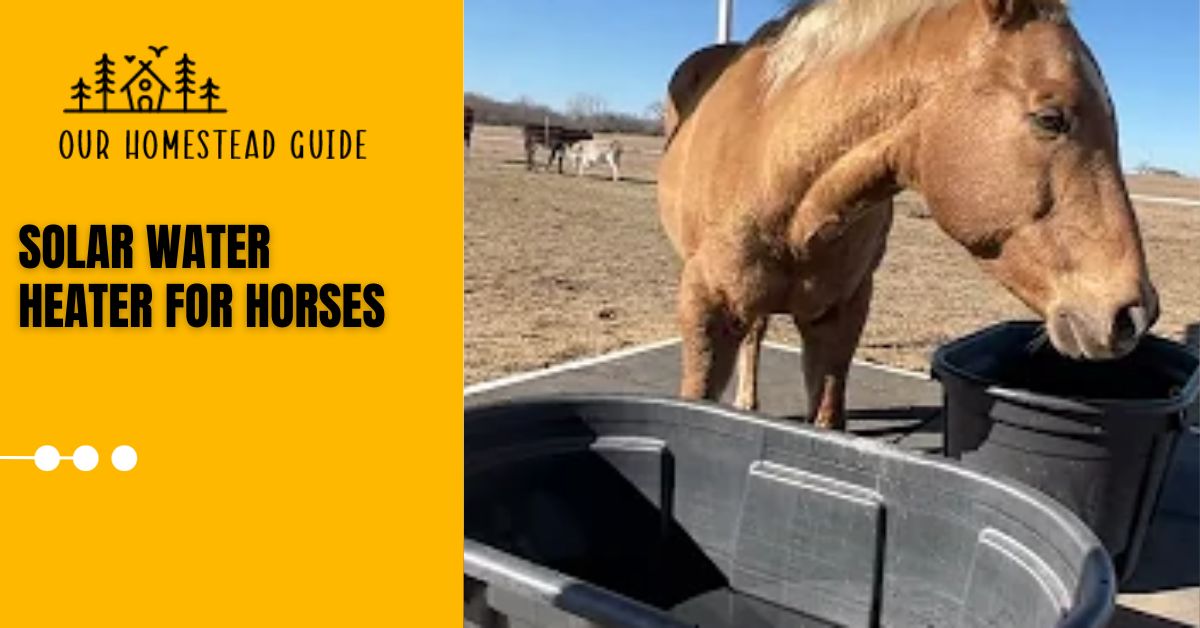High Efficiency of Solar Water Heater for Horses
The Solar Water Heater for Horses, manufactured of strong plastic/rubber and featuring a shatter-resistant solar panel, provides a horse-safe alternative for keeping water from freezing. Horses drink from the top by pushing down a bob cover, which keeps the water cold in the summer and warm in the winter.
Positioning the tank with the solar panel facing south prevents it from overheating in the summer, making it a practical and safe year-round option.
Materials and Tools:
| Materials and Tools | Description |
| Water trough | A container for holding water for the horses. |
| Solar-powered aquarium bubbler | A 20-watt device to keep water from freezing. |
| Electric water heater | A 1500-watt heating device (used if necessary). |
| Timer (if needed) | Used to control the electric water heater. |
| Insulation (for extreme cold) | Additional insulation for very cold conditions. |
How to Solar Water Heater for Horses?
1-Examine Your Environment:
Determine the average winter temperatures in your location and how frequently you need to prevent water from fully freezing.
2-Set up the Water Trough:
Place the water trough in a position that is both accessible and safe for your horses.
3-Install a Solar-Powered Aquarium Bubbler:
In the water trough, place the solar-powered aquarium bubbler. Make sure it’s above the water level to prevent siphoning when the electricity goes out. Build an insulated enclosure for the bubbler if necessary to help it work more efficiently.
4-Put the Bubbler to the Test:
Turn on the bubbler. The bubbler’s circulating water should assist keep a section of the water surface from freezing, allowing your horses to reach unfrozen water.
5-Keep an eye on the Water Trough:
Check the water trough on a regular basis to ensure that it does not freeze over. The bubbler should be enough to keep the water open in fairly cold temperatures (about -5 to -10 degrees Celsius).
6-Turn on the electric water heater (if necessary):
In colder weather, when the bubbler alone cannot keep the water from freezing, you may need to utilize the electric water heater.
To regulate the heating, set a timer. Set it to run for brief durations (e.g., 30 minutes) multiple times a day to keep the water from freezing. The precise timing will be determined by your local climate and the horse’s water consumption.
7-Adjust and monitor:
Keep an eye on the water trough at all times. If ice begins to develop, alter the timer settings to increase the heating frequency or operate the water heater manually for a brief amount of time until the ice is gone.
8-Turn off the water heater:
Unplug the electric water heater after the water is clear of ice to conserve electricity. In milder weather, you may not need it at all.
9-Maintenance regularly:
Maintain a clean and debris-free water trough. Examine the equipment for any damage or wear, and make sure it’s in good working order.
10-Insulation is optional:
Consider putting more insulation around the water trough in exceptionally cold weather to limit heat loss and the need for an electric water heater.
Solar Water Heater
Solar water heaters provide warm water for horses in cold seasons, saving money and protecting the environment. The warm water helps horses stay healthy and comfortable. Consider factors like climate, roof orientation, shading, and water usage when choosing a system. The cost of installation is offset by long-term energy savings.
15 Tips for Solar Water Heaters for Horses
Solar water heaters for horses may be a wonderful method to offer a consistent source of warm water for your animals, especially during the winter months. Here are some pointers on how to set up and maintain a solar water warmer for horses:
1-Select the Best System: Choose a solar water heating system that is appropriate for your climate and the number of horses. The system should offer enough hot water to fulfill the demands of your horses.
2-Proper Positioning: Install the solar collector panels in an area that receives the most sunlight during the day. South-facing roofs and ground-mounted panels are popular options.
3-Insulation: To avoid heat loss, make sure the water storage tank is well-insulated. Even on gloomy days or at night, proper insulation can help keep the water warm.
4-Heating as a backup: Consider adding a backup heating system, such as an electric or gas heater, for days when solar heating is insufficient.
5-Frost resistance: If you reside in a location prone to freezing conditions, anti-freeze or drain-back devices are required to avoid damage to the solar collectors and pipework during cold weather.
6-Maintenance on a regular basis: To optimize efficiency, keep the solar collectors clean and clear of dirt. In order to guarantee efficient heat absorption, inspect and clean them on a regular basis.
7-Keep an eye on the temperature: To monitor the water temperature, install a thermometer or temperature sensor in the water tank. This helps to ensure that the water is pleasant and safe for your horses.
8-Safety: To avoid contaminating the water supply, use high-quality, food-grade plumbing materials. Inspect the plumbing on a regular basis for leaks or damage.
9-Avoid Overheating: The water in the solar heater might get too hot for the horses to drink in hot weather. Install a mixing valve if cold water is required.
10-Checks on a regular basis: Check the system on a regular basis for leaks, weak connections, and other maintenance concerns to ensure it runs smoothly.
11-Precautions for Safety: Ascertain that the solar water heating system is placed safely and that it does not endanger your horses. Keep any electrical components out of reach of children and pets to avoid mishaps.
12-Prepare Yourself: Know how the system works and how to handle typical problems. This will allow you to fix any issues as soon as possible.
13-Compliance: Ensure that your solar water heater installation conforms with local construction laws and regulations
.14-Training: Teach your horses how to operate the system. Some horses may be initially suspicious of the system’s sound or look, therefore acclimating them to it is critical.
15-Plan for an Emergency: Prepare a strategy for system failure, power outages, and other crises. Make sure you have a backup water source for your horses in case the solar system goes down.
Benefits of Solar water heater for horses
Using a solar water heater for horses has various advantages for both the animals and their owners. Here are some of the main benefits:
Savings: Solar water heaters use sunshine to heat water, decreasing or eliminating the need for energy or gas to heat water. This can result in huge savings on energy expenditures.
Environmentally beneficial: Solar water heaters are a sustainable and environmentally beneficial way to heat water. They help lower greenhouse gas emissions and your carbon footprint.
Energy independence: Solar water heaters provide a supply of hot water that is not reliant on grid energy or fossil fuels. This is especially useful in rural regions or during power shortages.
Easy to maintain: Solar water heating systems require little maintenance as compared to typical heating systems. Routine cleaning and inspections are usually all that is necessary.
Longevity: Solar water heaters that are well-maintained may have a long lifespan, frequently reaching 20 years. Over time, this longevity can result in considerable cost savings.
Versatility: Solar water heaters may be built in a range of environments, such as barns, pastures, and outdoor locations. They may be tailored to your equestrian facility’ exact requirements.
Energy Conservation: Solar water heaters are extremely energy-efficient because they convert sunlight into heat with very little energy loss. This efficiency is especially crucial when it comes to supplying horses with a steady supply of warm water.
Year-Round Warm Water: Solar water heaters can supply warm water all year, even during the colder months. This is critical for ensuring that horses have access to warm water for drinking and washing, since this can be critical to their health.
Horse Health Advantages: Warmer water is typically preferred by horses, especially in cold weather. Warm water encourages horses to drink more, lowering the danger of dehydration.
Energy Savings for Farm Operations: If you have a large number of horses or other livestock, a solar water heater can greatly decrease the energy expenses associated with giving warm water to all of them.
Incentives from the government: Depending on where you live, government incentives or tax credits for installing solar water heating systems may be available, which can help offset your initial expenditure.
Property Value Increase: A solar water heating system can increase the value of your home since it is seen as an appealing and environmentally responsible feature by potential buyers or lessees.
Conclusion:
A solar water heater for horses is cost-effective, eco-friendly, and low-maintenance. It provides a consistent supply of warm water all year, increasing horse well-being while lowering energy costs and environmental impact.
Most Frequently Asked Questions!
1-How does a solar water heater work for horses?
Solar water heaters heat water within a collector using sunshine. The heated water is then stored and made accessible to your horses, ensuring a steady supply of warm water.
2-Are solar water heaters suitable for all climates?
Solar water heaters are successful in a variety of regions, although their efficacy varies. A backup heating system may be required in colder areas to assure a continuous supply of warm water.
3-How do I maintain a solar water heater for horses?
Cleaning the solar collectors, checking for leaks or damage, and ensuring correct insulation are all part of routine maintenance. For best performance, it is critical to keep the system in excellent operating condition.
4-What are the benefits of using warm water for horses?
Warm water encourages horses to drink more, which lowers the danger of dehydration. It’s also great for washing and brushing your horses, especially in colder weather, increasing their health and comfort.
5-Is there financial support or incentives for installing a solar water heater for horses?
Depending on where you live, there may be government incentives, rebates, or tax credits available for solar water heating system installation, which can help cover your initial expenses.
6-Can I use a solar water heater in conjunction with traditional heating methods?
Yes, many solar water heating systems may be combined with backup heating sources such as electric or gas heaters to provide a continual supply of warm water, particularly on overcast days or at night.
7-How long does a solar water heater for horses typically last?
Solar water heaters that are well-maintained may have a lifespan of more than 20 years, making them a long-lasting and cost-effective choice for horse owners.
8-What safety precautions should I take when installing a solar water heater in a horse facility?
Ascertain that the equipment is safely placed and does not endanger horses. Keep electrical components out of reach of children and keep a backup water supply on hand in case of system failure.
9-Are there any specific regulations or permits required for installing a solar water heater for horses?
Check your local building laws and regulations to ensure that your installation meets any permits or requirements in your region.
10-Can horses adapt to using a solar water heater system?
Horses will normally adjust to the presence of a solar water heater over time, but it is best to introduce them to the system gradually and monitor their comfort and behavior throughout the changeover.
you may also like this article.
Solar Powered Stock Tank Heater: Eco-Friendly Livestock Water Heating


